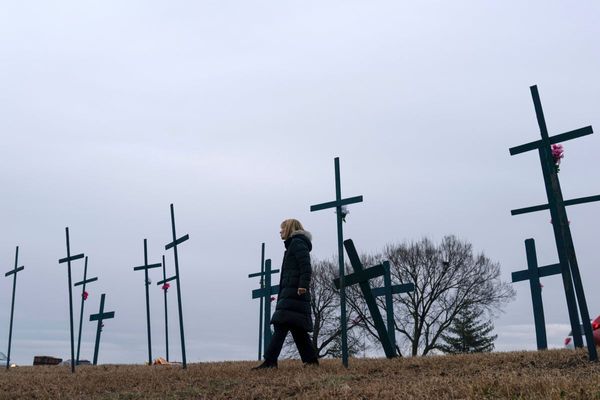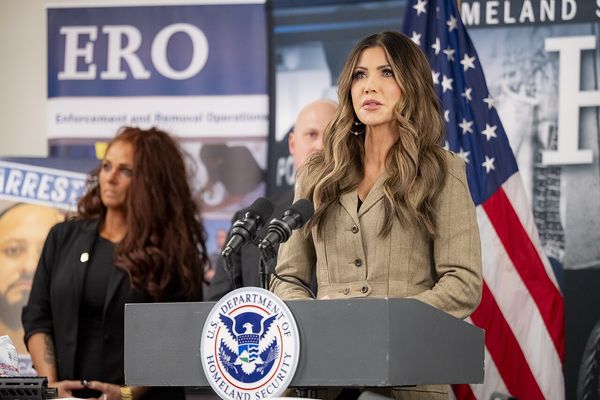
‘We’ve just had the king’s coronation and people are still going hungry. What’s that about?” Food charity founder Cocoa Fowler speaks with the passion of someone who daily bears witness to an increasing number of people struggling to feed themselves and their families.
Hunger is now widespread in the UK. Almost 10 million adults and 4 million children do not have enough to eat – nearly double what it was a year ago. More than 2 million adults cannot afford to eat every day. It has been called a “domestic humanitarian crisis”. Which is why Fowler and others like him have felt compelled to set up local food banks and community larders.
‘It’s very humiliating for people – they’ve not asked for this to happen to them’
Deepa Chauhan, Burnt Oak community food bank
Deepa Chauhan’s day job used to be in marketing and PR, but now staving off hunger for the residents of Burnt Oak, a suburb in north-west London, has become a full-time occupation.
She had been involved in feeding homeless people for 13 years, but when Covid hit, the food run came to a halt. She started filling her car boot with provisions instead – “chocolate bars, crisps, drinks, just non-perishable items” – and offering them to charities.

“There was a lot of deprivation in Burnt Oak, an area that’s been overlooked for years and years,” she says, describing it as “a very diverse area full of beautiful souls who are just misunderstood, overlooked and unheard”.
She set up Burnt Oak community food bank (BOCFB) in March 2021, initially as an eight-week pilot scheme feeding approximately 25 people. “We delivered fresh produce, so it was yams, plantains, coriander – the type of things that our local, diverse community needs.” It has been running ever since.
In the beginning, Chauhan paid out of her own pocket, with the help of a few donors: now they receive regular donations. “When we started it was £250 [a week], now it’s off the radar.” Their ethos, she says, is to serve “anyone and everyone coming through our doors”.
At the moment, that looks like 150 people every fortnight – “they queue up from 11 in the morning, though we don’t open the doors until 2pm”. Then they go across to a local hotel that houses more than 700 people. “Their situation is very dire. They’re refugees, asylum seekers. We also have homeless people, ex-convicts, people who’ve just been released from prison.”
Reading some of the emails she receives asking for help, it is, she says, “hard to have a dry eye”. What were all these people doing before BOCFB came along? “A lot of them were starving,” she says.
“We need to restructure the whole way we deal with this crisis of food shortages and food poverty,” she says. “It’s very humiliating for people to reach out and ask for help … There needs to be empathy, there needs to be dignity, there needs to be respect in understanding that the clients walking through their doors, they’ve not asked for these situations to happen to them.”
She thinks the government should give more support to grassroots initiatives like BOCFB. You can see why – Chauhan takes immense pride in knowing her community and its needs. During Ramadan, they bought in fresh dates to break adherents’ fasts. Plus, they have been serving hot meals “because we know we’ve got a lot of single parents, or elderly people, who can’t afford to prepare a meal so it’s piping hot.”
“We make sure that we are able to sleep at night knowing that people who’ve come in, they’ve got provisions, they’ve got halal, they’ve got porridge.” If it is a pork pie Chauhan’s clients need, “because they’ve got arthritis and can’t utilise their cooking facilities properly,” it is a pork pie they shall get. “We know, hand on heart, that our community is being taken care of, and that’s really important.”
‘It started with the homeless, then people in need, now it’s everybody’
Cocoa Fowler, Food for Nought
The story of how Cocoa Fowler founded Food for Nought is not one he likes telling: “It comes out of hunger.” Brought up in care, he served 15 years in the British armed forces – in Iraq, Germany and Afghanistan – before coming back to the UK. “Nothing was going well for me,” he says, and he found himself homeless.
People often talk about the stigma of homelessness, but for Fowler his stigma was further complicated: “I was ex-military – it makes you the action man, the big boy, the strong person … The last thing I’m going to do is walk into a church hall and say, ‘I need help.’”
He was, he says, fortunate that a charity turned round to him and said, “‘You don’t need to have this stigma hanging over you. You’re a driver, why don’t you drive one of our vehicles?’” He started driving to pick up surplus food but “realised there was more food that needed picking up than we were able to”. This was when he had the idea of Food for Nought, the charity he now runs, picking up surplus produce from supermarkets and local farms and redistributing it to charities.

Its 12 volunteers deliver food from farms and supermarkets to 15 community fridges and food banks in the charity’s three vans, providing for upwards of 1,500 people a week in the Peterborough and Huntingdonshire area.
The problem, he says, is not a lack of supplies – “the food will never run out”. But “we need more organisations and centres that can turn this into meals – maybe then we would be able to say there’s not one child in this school that hasn’t got a meal, there’s not one person in a household that’s struggling that hasn’t got a meal, because we can provide that.”
This is a sore spot for him: he has a “beautiful centre that needs maybe half a million quid to get it up and running, but it’s been sat there” because the funding isn’t available. “We feed 1,500 a week now; we could be feeding triple that. We have offers of volunteers. Even my landlady, who is a qualified baker and teacher, has said, ‘If we can get this built, I can teach baking courses.’”
The levels of hunger he is currently seeing are unprecedented. “This is the madness about it … I have an awful lot of friends who work in businesses or organisations like the NHS, the trains, middle-level workers, and they’re struggling to pay their bills and they need feeding.” The need has grown, and is continuing to grow. “It started with the homeless, then went to people in need, then went to lower levels, now it’s actually, I’d say, everybody.”
Fowler has ample and personal reason to feel passionate – he himself would still be going hungry if it weren’t for the excess food he accesses via his own charity. “I don’t think I’d be able to survive on the benefits I get if it wasn’t for charities like myself,” he says.
‘We’ve never, ever called it a food bank; we call it a free food stall’
Katie Barry, St George’s Church of England primary school, Lincolnshire
The day that Boris Johnson first announced he was closing schools because of Covid, head teacher Katie Barry’s first thought was not about her pupils’ education but about what they were going to eat. Her school sits in “a real pocket of exceptionally high deprivation”. Nearly 80% of pupils are entitled to free school meals; the national average for primary level is 25%.
She has been head of this school for 17 years, and already knew there were a lot of hungry children there. “We’ve always done things to help,” she says, but Covid meant there was “less pressure for a little while on teaching … That gave us the green light to really concentrate on what our families needed.”
What they needed was food. “We were properly closed for one day, and on the second day we started providing lunches for families through the school gates.” At first it was just jacket potatoes. “Then local shops and people heard what we were doing and donated some food,” which they served along with school meals. “Then it just grew and grew.” Soon, Barry was effectively running a food bank out of the school.
They partnered with FareShare, the charity for which Marcus Rashford is an ambassador, which would deliver about 700-800kg of food a week. “We started doing that and we’ve just never been able to stop it, and I don’t know when I ever will be able to stop it,” she says.
While the pandemic might be over, deprivation has got worse. “We always had some food poverty but now it’s not just that lowest, neediest layer; there’s more children, there’s children whose parents do work.” Barry says that even members of her staff have been forced to use the service.
It is particularly because of families who are new to hunger that Barry has been careful how she has gone about things. For example, she has “never ever called it a food bank. We call it a free food stall, and I would hazard a guess that quite a few of the parents, if you asked them ‘Do you use a food bank?’ they would say ‘No’.”
Where people used to be quite picky about what they would take, now it is anything and everything – “it all just goes,” something she puts down to the cost of living crisis.
Barry thinks budgeting should be put on school curriculums. And how to cook the basics. At her school, they are teaching the children these skills, plus they have an allotment where they grow food.
They are also teaching parents. “We try to have a more all-inclusive approach to it – so don’t just take the packet, take some of these potatoes and carrots and cabbages and look what you can turn them into.” While fresh fruit has always been popular, vegetables would often be left behind. But she says this without judgment: “You’ve got to understand the background … And you can’t put your own values on to somebody else’s life.”

‘My constant phrase is, “It’ll only go to waste …”’
Debbie Caulfield, Eglinton community larder
Debbie Caulfield describes Eglinton, where she lives and works, managing the community centre, as a relatively affluent village. “If you looked us up in the statistical records, we wouldn’t be an area of multiple deprivation,” she says, but there are people who previously had “money to feed their families and meet their housing needs and everything else”, and because of hikes in prices can no longer afford to do so.
In her village of about 4,000 people, just outside Derry, the larder is regularly used by a couple of dozen people a week, plus others more occasionally. “It’s mainly things like bread, baking products,” she says. Plus: “There’s someone local who produces a lot of eggs on their farm that are too small for sale, so on a regular basis he donates all those small eggs. Trays and trays full.”
The amount taken has been unexpected. “When some of the local schools have done a collection and every shelf of the larder has been full, and the next day everything has been taken away, that has surprised me.”
Caulfield says that part of the problem is accessing fresh food: “If you are in a rural community, then the cost of transport going to some of the larger supermarkets” is part of the equation for people.
She is thinking more broadly about strengthening food security in her village, and has also been involved in planting a community orchard of plum, pear and apple trees on a piece of council land “so people can access fresh fruit and vegetables, grow some of their own and share that produce between each other, because poverty and food hunger do have a stigma attached to them.”
The larder was in part a response to “the realisation in the middle of all that [panic] buying that there was a lot of food waste at the time as well … yet people need this food and how can we distribute it in a relatively straightforward way?” Continuing to market the larder as an answer to food waste has, she thinks, helped to soften the stigma of taking from it. “My constant phrase is, ‘It’ll only go to waste.’ The whole point about it is not to make people feel as if they’re in need. I’d rather people feel as if they’re doing us a favour by taking the stuff.”
That anything should go to waste when others are hungry is, she says, “such a shame and I suppose that’s what drives me, thinking why should anyone be sitting hungry when there’s food there that can be given away? Doesn’t make any sense at all.”
• Do you have an opinion on the issues raised in this article? If you would like to submit a letter of up to 300 words to be considered for publication, email it to us at guardian.letters@theguardian.com







